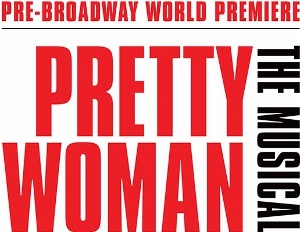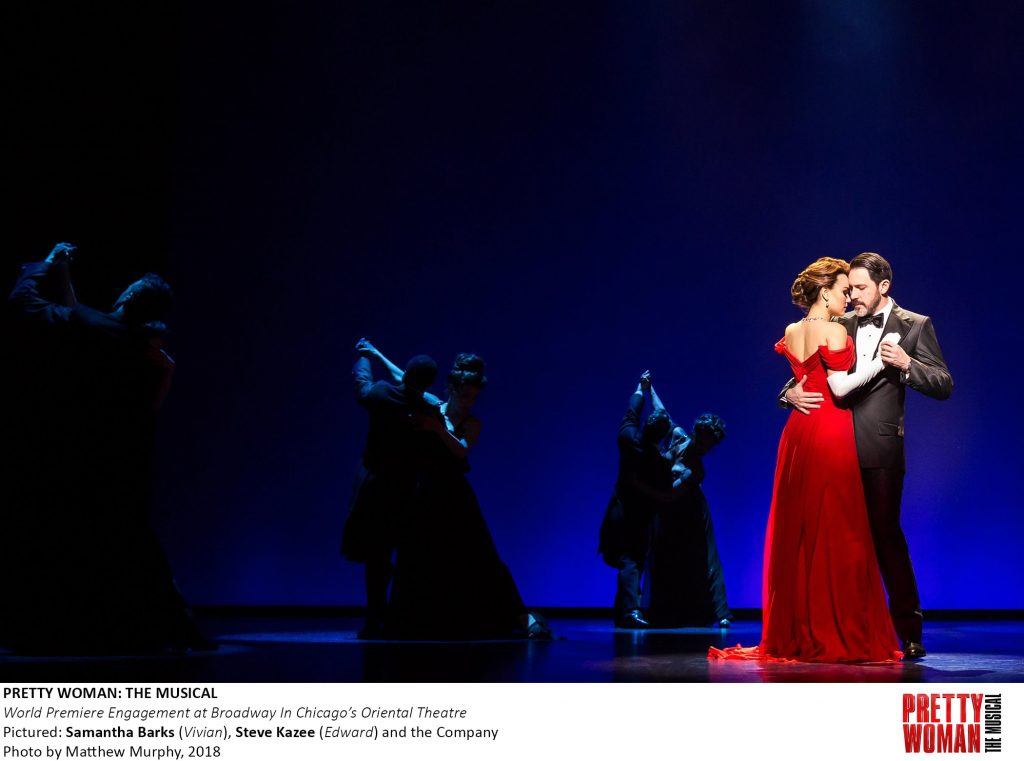PRETTY UNLIKELY WOMAN
When worlds collide: A celluloid fantasy about an L.A. call girl suddenly thrust into affluence, the much-loved 1990 film Pretty Woman starred a suave, salt-and-pepper-coiffed Richard Gere and Julia Roberts’ all-American Cinderella. The film drew on the wishful feeling of an inexhaustible fairy tale — and for good measure also referenced My Fair Lady, Educating Rita, Born Yesterday, Gigi, and, in its transformation of a mercenary money man into a redeemed soul, even A Christmas Carol.
Now, in a Broadway-bound tryout at Chicago’s Oriental Theatre, it’s Pretty Woman: The Musical (sadly minus Roy Orbison’s 1964 title song). With bizarrely country-western music by Bryan Adams and Jim Vallance, a faithful script by the late Garry Marshall (the movie’s director) and J.F. Lawton (from his screenplay), and a crowd-pleasing staging by Tony-winner Jerry Mitchell, it’s got the credentials and, at times, the chops, to justify the screen-to-stage transformation. But just barely’¦
Above all, it combines the rags-to-riches formula that, from Horatio Alger to American Idol, is catnip to a Yankee crowd with the “fish out of water” humor of opposites who attract. Vivian Ward (a charismatic Samantha Barks) is a 1980s Hollywood prostitute who hooks under the tough-loving tutelage of heart-of-gold madame Kit DeLuca (Orfeh). Missing her native Georgia and not overjoyed to rent her body for $100 an hour, she longs for “Anywhere But Here.” She’s ripe for change — and she’s not the only one.
Uncertainly, then happily, it’s kismet when, meeting cute, good-time girl Vivian encounters newly single Edward Lewis (a less charming Steve Kazee), a hedge fund manager, corporate raider, and “mergers and acquisitions” mogul. He’s looking for the right escort to impress and distract during this week’s “hostile-takeover” networking and negotiations.
Fairly improbably, he hires her as “a sure thing” at the final price of $3000 for six days. A sudden dress-to-impress courtesan, Vivian gets to drive Edward’s Lotus Esprit sports car and is soon resplendently ensconced in the penthouse of the Beverly Wilshire Hotel. While on the (tinsel) town, eye-candy Vivian gets to dance at the Voltaire night club (“Don’t Forget to Dance”), strut her stuff at a polo match (where Edward displays some unearned jealousy), wear rented bling and gorgeous gowns (“Rodeo Drive”), enjoy her first Verdi from an opera box, and, crucially, inspire Edward to buy — rather than destroy — a ship-building company (because now he knows that life is about doing, not getting).
Along the way the musical has fun with the unlikely lovers’ uptight-versus-carefree contrasts. In short time the flagrantly un-phony Vivian either wins over or therapeutically alienates snobbish sales ladies, Edward’s sexually predatory, amoral lawyer (Jason Danieley) who fears she’s a company spy, the gay hotel manager (Eric Anderson, crooning “On a Night Like Tonight”), and a perky bellhop Giulio (Tommy Bracco).
At first eager to please in the worst professional way (“No kissing on the mouth” and “It was a business doing pleasure with you”), Vivian slowly opens up to Edward’s confessions of a similarly stunted childhood and lack of love. And, just as her scuzzy cohorts cavort in their red-light district, Vivian learns to “Never Give up on a Dream,” even as she agonizes about what’s next (“I Can’t Go Back”). Learning that a heart is more than just a circulator of blood, Edward mellows and gets real — in incongruously Nashville-style ballads like “Freedom,” “Something About Her,” and the first-act finale “You’re Beautiful.”
Inevitably and unstoppably, Vivian’s joie de vivre kick-starts Edward’s buried passions. They go from two operators who routinely screw other people in dramatically different ways to all the harmonies of “You and I.”
In the final scene Edward, acting out Vivian’s childhood dream of a happy ending a la Rapunzel, snatches her from the jaws of poverty, wondering, “So what happens after he climbed up the tower and rescues her?” to which she pertly answers, “She rescues him right back.” Both have come, like their final duet, a “Long Way Home.”
For many audience members, the show’s cinema-to-showbiz shocks of recognition will be sufficient satisfaction. But right now, still on its pre-Broadway shakedown cruise, Pretty Woman: The Musical lacks the urgency to justify this switch to three dimensions. Never less than serviceable, the countrified songs nonetheless seem more appropriate for L’il Abner than this sophisticated story.
Admittedly it’s impossible to make fans forget Julia Roberts but Barks’ Vivian is sweetly seductive and down-home decent in “This Is My Life” and “Look at Me Now.” Kazee fares less well, a cold fish who never successfully swims or quite warms to her occasion. Orfeh is a force of nature as the mother hen to her portable bordello. Mitchell’s fairly-minimal choreography is perfunctory fun.
The musical’s mutual “rescue” ultimately founders on feel-good fantasizing that’s less than rooted in reality. The very title “Pretty Woman” betrays its generic, even sexist, approach to the untidiness of love. A title closer to the facts would be “Rich Man” — plus it would drive home the show’s bedrock ethic: Living well is the best revenge.
photo by Matthew Murphy
Pretty Woman: The Musical
pre-Broadway world premiere
presented by Broadway in Chicago
at the Oriental Theatre until April 15, 2018
for tickets, call 800.775.2000 or visit Broadway in Chicago
begins on Broadway July 20, 2018
for tickets, visit Pretty Woman on Broadway



{ 2 comments… read them below or add one }
Wow! Sounds even worse than the film. Should be a big hit!
And that one photo is the only one the press agents provided?
Yes, that’s the only production photo provided.